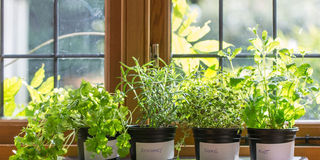Did I get my indoor garden all wrong?

What you need to know:
The lockdown sent many into gardening. Yet, even with the time invested, some of the gardens did not yield a thing.
If there is one thing Covid-19 taught, us it is a fact that there are many ways we can improvise without sliding into our pockets for necessities.
Take an example of vegetables and herbs, there was a time we used to spend on all sorts of herbs and spices such as aloe vera, collard greens, cloves, rosemary, garlic, chives or oregano.
This gave birth to gardening as a hobby, those with and without backyards took on the activity – many of these were doing it indoors, by the window or in the kitchen.
However, despite the effort, some of these gardens did not yield results.
Jamirah Namusoke, a florist, explains that there are many reasons plants indoor always fail.
Location
Namusoke says that the location of the plant matters because the plant will need enough sunlight and fresh air.
“Houses are built differently and at times, windows will not be in a pole position for sunlight which definitely will affect an indoor plant if you decide to have one,” she says.
Namusoke notes that if a plant cannot easily get sunlight through the window, one can opt having it displayed in a location where it can get natural light at least once a day.
“Sometimes, a plant may be in a location that only receives light only once in a day, but that will be okay. What matters is the plant receiving light,” she says.
Namusoke says that unlike outdoor plants that can be placed anywhere, indoor plants are particular about placement. She says even in congested locations, one needs to find a suitable location where a plant can easily get natural light.
Type of plants
Since many people started their indoor gardens during the lockdown, there was little time put into planning the type of plants they were intending to grow.
Some ended up with plants that could work well outdoors because of their nature, while others got it right, especially with ornamental water plants.
It is important to choose the right plant to have inside the house, especially if the interior does not have access to natural light.
If your room is not gifted with a lot of space to use, there are plants whose care is manageable in small spaces.
These plants can grow well with minimal sunlight, which works well for people with only a window or none.
The Zanzibar plant for instance thrives in less and indirect light, and unlike many other plants, this still uses less water, thus, if you are the kind that may neglect a plant for weeks, you will enjoy having this one around.
Others include the coffee plant, rubber plants and pilea, the down issue about all of them though is that none of them is a herb.
Planter choice
According to Namusoke, indoor plants can be very complicated thus, many things will have to be thought about. For instance, where an outdoor plant may out rightly go into the ground, an indoor plant will be fitted in a planter.
The type of the planter most of the times must match the plant, for instance, if the plants are ornamental and thus totally decoration, plastic and pots can be the ideal choice.
Yet, if one is choosing vegetables for their indoor plants, pressed paper containers will do the job best. These containers breathe well, promoting healthy root growth and improving aeration, as well as insulating the roots from temperature changes that might otherwise harm or stress your plants.
Problem is that these containers decompose after sometime so they have to be replaced almost annually.
But these planters of course need a good soil selection, Namusoke advises that soil has to be tested by an expert since some plants need soil that retains water for a longer time compared to others.
Prune indoor plants
Namusoke says that pruning of plants, especially those that are inside all the time helps them look healthy without shedding leaves all the time.
“This also helps in managing their growth direction. This can help you stop them from growing far and wide, if you are staying in a small space,” she says.
Namusoke adds that every plant has its own needs and thus, people need to research before buying.
Sunlight.
If you are determined to try indoor herbs anyway, do your research, keeping in mind what you plan to grow. You might not want to place a rosemary plant, which likes a south-facing window, next to thyme, which prefers to face east or west.
Use appropriate pots with the proper soil mixture for your herbs, and be careful about watering.




